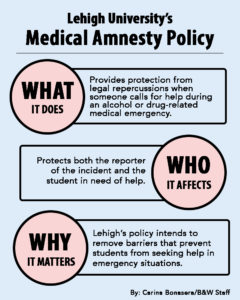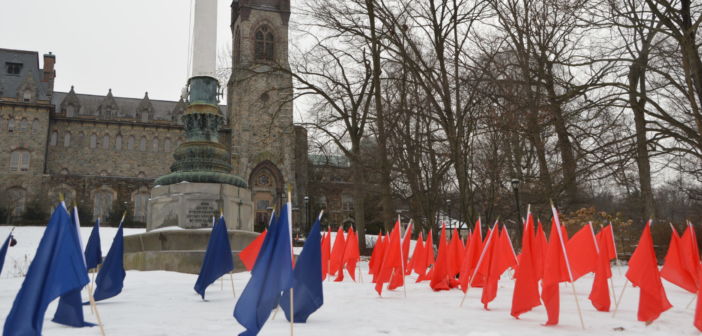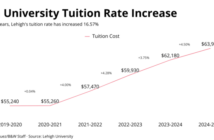As a new academic year begins, Lehigh administration and student groups are advocating for alcohol safety through medical amnesty policies, peer education and outreach.
Student Senate President Zach Vinik, ’20, said Senate aims to change Pennsylvania law to better protect students.
The state law, the Pennsylvania Good Samaritan Law on medical amnesty, states that any person who uses emergency care to help another person in need will not be prosecuted.
While Pennsylvania law protects the person who calls for medical attention – otherwise known as the reporter – it does not protect the individual who needs assistance. However, Lehigh medical amnesty policy protects both the reporter and the student in need of assistance.
“The long and short of the policy is: if you call for help for someone, no one gets in trouble with the university,” said Christopher Mulvihill, an associate dean of students. “If an organization calls for help for a guest, the organization does not get in trouble and the person they call for (to receive) help does not get in trouble.”
Vinik said last year Senate partnered with 20 colleges to draft a letter advocating to align university and state policies, so both the reporter and the student requiring help would be protected in the state of Pennsylvania.
While Senate and student leadership at other schools push for the laws to be the same, other groups at Lehigh want to make sure that students are educated about alcohol safety.
 Reagan Sullivan, ’20, the public relations chair of Senate, said Senate led a demonstration on the UC Front Lawn last year where 113 flags were placed to illustrate alcohol-related incidents at Lehigh. Red flags represented the number of alcohol-related hospitalizations and blue flags represented the number of medical amnesty calls in the fall and spring of 2017.
Reagan Sullivan, ’20, the public relations chair of Senate, said Senate led a demonstration on the UC Front Lawn last year where 113 flags were placed to illustrate alcohol-related incidents at Lehigh. Red flags represented the number of alcohol-related hospitalizations and blue flags represented the number of medical amnesty calls in the fall and spring of 2017.
Sullivan said the Interfraternity Council, Panhellenic Council and Cultural Greek Council helped host the event.
Mulvihill, who originally wrote the medical amnesty policy in 2006, said only 43 students used the policy in the 2017-2018 academic year. He said students should stop worrying about the details of the policy and get help for students who need it.
“It’s not scary,” Sullivan said. “(The policy) helps to open up conversation.”
Sullivan said students must continue to improve bystander intervention and look out for each other to build inclusivity and safety.
Ellie Ginis, ’19, the programming and events coordinator of Peer Health Advisors, said although the university has a long-standing drinking culture, organizations like Peer Health provide ways for students to learn about safe drinking habits.
Peer Health runs “Calling the Shots,” a 5×10 program offered to first-year students about alcohol intervention and responsible drinking habits.
Such programs are not only for first-year students. Ginis said Peer Health programming strives to educate different groups with students of all ages, such as fraternities, sororities and athletic teams
“I feel like if I were to look at the number of hospitalizations from this time last year versus right now, the data would prove that students are becoming more aware and unafraid to utilize bystander intervention strategies,” Sullivan said.






Comment policy
Comments posted to The Brown and White website are reviewed by a moderator before being approved. Incendiary speech or harassing language, including comments targeted at individuals, may be deemed unacceptable and not published. Spam and other soliciting will also be declined.
The Brown and White also reserves the right to not publish entirely anonymous comments.
2 Comments
Lehigh’s medical amnesty is not amnesty – it is full of gottchas at the school level.
Groups like Students for Sensible Drug Policy – advocate and grade schools for their policies – Lehigh University should submit its information to get graded.
https://ssdp.org/campus-policy-gradebook/
The starting point in its recommended policies include:
“MEDICAL AMNESTY POLICIES
A full medical amnesty policy is defined as an explicitly stated and publicized policy which protects victims,callers, and bystanders in alcohol and drug related emergencies from legal or school sanctions. Medical amnesty policies save lives by removing the fear of calling for help during alcohol or other drug related emergencies, greatly increasing the likelihood that such an event is survivable and, in the case of ongoing substance misuse, a student will participate in counseling and thereby reduce the risk of additional events.”
It looks like LU has a distance to go to get more blue flags on the lawn.
Don’t these people have anything better to do than drink themselves in the hospital?
No wonder why despite Lehigh’s low acceptance rate it keeps tumbling down the US News charts. It was in the low 30’s for National Universities when I was there!